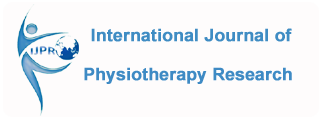IJPR.2021.196
Type of Article: Review
Volume 9; Issue 8 (December 2021)
Page No.: 4066-4070
DOI: https://dx.doi.org/10.16965/ijpr.2021.196
Physiotherapy in Long Term Physical and Mental Health of People Recovered from COVID 19: A Systematic Review Protocol
Vyom Gyanpuri 1, C. Mohanty 2, Neetu Rani Dhiman *3.
1 BPT, MPT- Orthopedics, Pursuing Ph.D.-Physiotherapy; Research Scholar in Department of Anatomy, Institute of Medical Sciences, Banaras Hindu University, Varanasi-UP, India.
2 Professor & Head, Department of Anatomy, Institute of Medical Sciences, Banaras Hindu University, Varanasi-UP, India.
*3 BPT, MPT-Neurology, Ph.D.-Physiotherapy; Research Associate in Department of Neurology, Institute of Medical Sciences, Banaras Hindu University, Varanasi-UP, India.
Corresponding Author: Dr. Neetu Rani Dhiman, BPT, MPT-Neurology, Ph.D.-Physiotherapy, Research Associate in Department of Neurology, Institute of Medical Sciences, Banaras Hindu University, Varanasi-UP, India. E-Mail: gyanpurineetu@gmail.com
ABSTRACT
The objective of the study to design a protocol on the effectiveness of physiotherapy on long term physical and mental health of recovered patients from coronavirus disease 2019.
Methods: The following electronic databases will be searched from inception to December 2021: PubMed, EMBASE, Web of Science, China National Knowledge Infrastructure, Chinese Biomedical Literature Databases, and other databases. We will include all published documents regarding this topic. Two separate individuals will analyse studies and select accordingly after removal of duplicate studies. Then, final screening, assessment of quality of the articles and data analysis will be done. Meta-analyses, subgroup analysis, and descriptive analysis will be performed based on the included data conditions.
Results: Methodological heterogeneity analysis of current evidence will be provided from Physical health outcomes like Barthel Index or Functional Independence measure scale and questionnaires describing health status like Physical Health Questionnaire and Mental health outcomes like SRQ-20, Hamilton Depression scale or Hamilton Anxiety scale.
Conclusion: This study will provide the evidence regarding the importance of physiotherapy in future physical and mental health of recovered COVID-19 patients, when performed during treatment of disease in acute hospital management. PROSPERO registration number: CRD42020190863
Key words: Coronavirus disease 2019, Protocol, Rehabilitation, Review.
REFERENCES
[1]. Bulut C, Kato Y. Epidemiology of COVID-19. Turk J Med Sci. 2020;50:563–70.
[2]. Tang JW, Tambyah PA, Hui DSC. Emergence of a novel coronavirus causing respiratory illness from Wuhan, China. J Infect 2020.
[3]. Liu Y, Gayle A, Wilder-Smith JR A. The reproductive number of COVID-19 is higher com-pared to SARS coronavirus. J Travel Med 2020, 1093/jtm/taaa021.
[4]. Mahase E. Coronavirus covid-19 has killed more people than SARS and MERS combined, despite lower case fatality rate. BMJ 2020;368:m641.
[5]. Adhikari SP, Meng S, Wu YJ, et al. Epidemiology, causes, clinical manifestation and di-agnosis, prevention and control of coronavirus disease (COVID-19) during the early out-break period: a scoping review. Infect Dis Poverty 2020;9:29Published 2020 Mar 17
[6]. Chen N, Zhou M, Dong X, et al. Epidemiological and clinical characteristics of 99 cases of 2019 novel coronavirus pneumonia in Wuhan, China: a descriptive study. Lancet. 2020;395:507–13
[7]. Jin YH, Cai L, Cheng ZS, et al. A rapid advice guideline for the diagnosis and treatment of 2019 novel coronavirus [2019-nCoV][8]. Huang P, Liu T, Huang L, et al. Use of chest CT in combination with negative RT-PCR as-say for the 2019 novel coronavirus but high clinical suspicion. Radiology. 2020.
[9]. A. Kandola, G. Ashdown Franks, B. Stubbs et al. the association between cardiorespira-tory fitness and the incidence of common mental health disorders: A systematic review and meta analysis. Journal of affective disorders. 2019;257:748-757.
[10]. Lifschutz JE. What is ”psychotherapy”? Int J Psychoanal Psychother 1984;10:91–107.
[11]. Brebach R, Sharpe L, Costa DS, et al. Psychological intervention targeting distress for cancer patients: a meta-analytic study investigating uptake and adherence. Psychoon-cology 2016;25:882–90.
[12]. Thomas P, Baldwin C, Bissett B, Boden I, Gosselink R, Granger CL, Hodgson C, Jones AY, Kho ME, Moses R et al. 2020 Physiotherapy management for COVID-19 in the acute hospital setting: Clinical practice recommendations. Journal of Physiotherapy. 2020.03.01.
[13]. Preferred reporting items for systematic review and meta-analysis protocols (PRISMA-P) 2015: elaboration and explanation. BMJ 2016;354:i4086.
[14]. WHO. Clinical management of severe acute respiratory infection when novel corona-virus [nCoV] infection is suspected. 2020. JMIR Public Health Surveill. 2020 Apr-Jun; 6(2): e19462.
[15]. Lisa Mary Sheehy. Considerations for Postacute Rehabilitation for Survivors of COVID-19 2020. JMIR Public Health Surveill. 2020 Apr-Jun; 6(2): e19462.
[16]. Brugliera L, Spina A, Castellazzi P et al. Rehabilitation of COVID-19 patients. J Rehabil Med 2020;52(4):jrm00046. doi: 10.2340/16501977-2678. PMID: 32286674.
[17]. Peter Thomas , Claire Baldwin et al. Physiotherapy management for COVID-19 in the acute hospital setting: clinical practice recommendations. Journal of Physiotherapy 2020;66:73–82.












 Users Today : 321
Users Today : 321 Users Yesterday : 187
Users Yesterday : 187 This Month : 3625
This Month : 3625 This Year : 32157
This Year : 32157 Total Users : 133930
Total Users : 133930 Views Today : 1081
Views Today : 1081 Total views : 477713
Total views : 477713 Who's Online : 8
Who's Online : 8